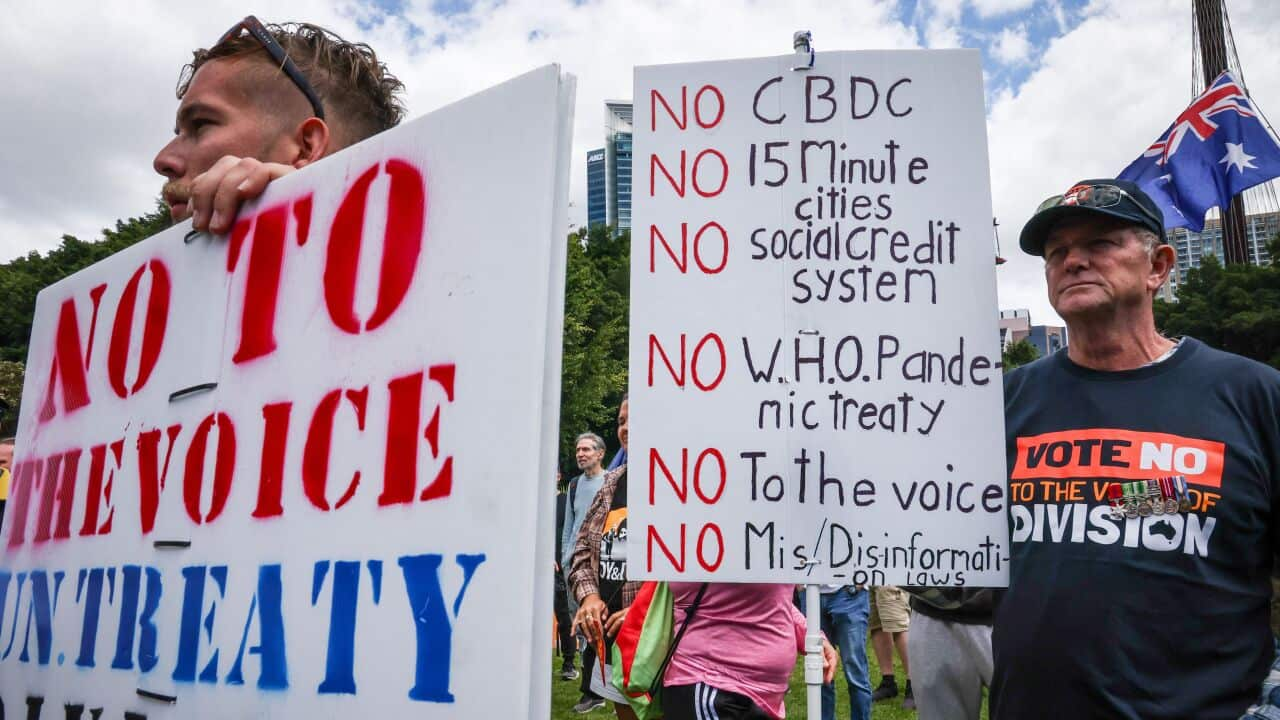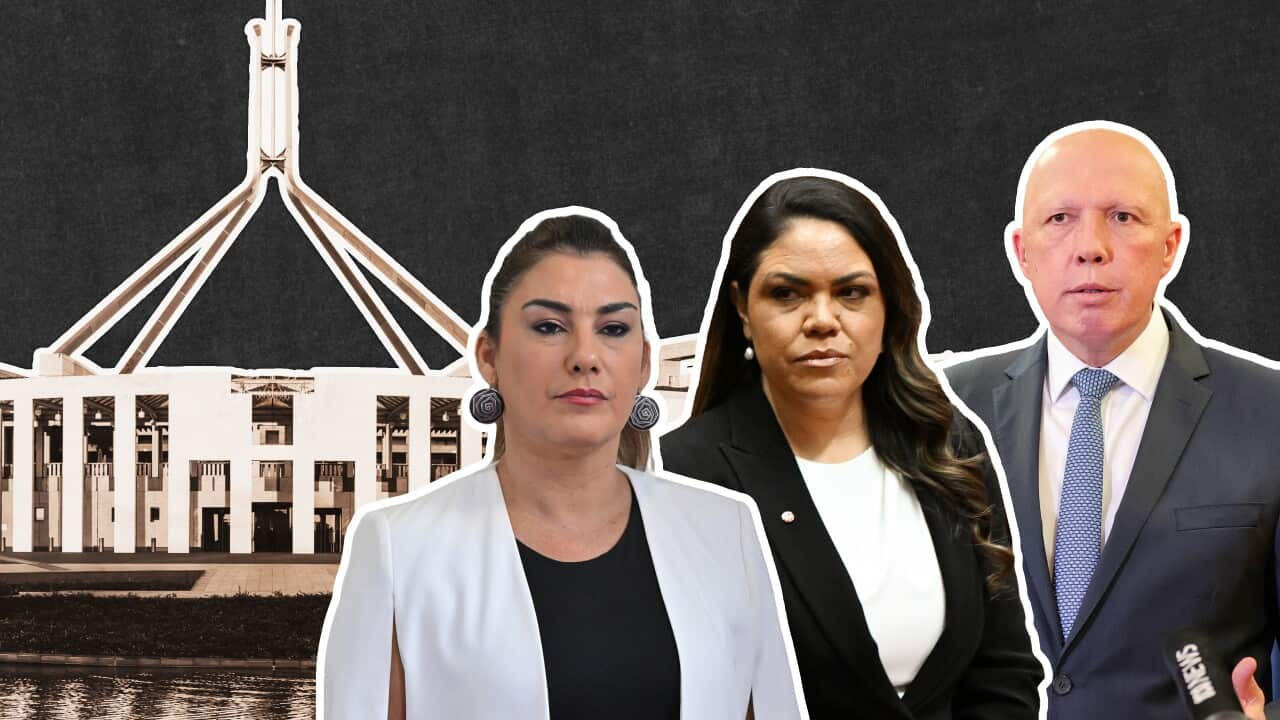It's not part of the prominent No campaigns from Fair Australia or the Blak Sovereign movement.
In fact, Fair Australia is distancing itself from it, and Opposition leader Peter Dutton, who is also against enshrining an Indigenous Voice to Parliament in the constitution, urged other Australians not to attend its No rallies.
It's the grassroots No campaign and its rallies are organised by a Putin-sympathiser and anti-vaccine social commentator hiding in the Russian consulate in Sydney.
The campaign is attracting a mix of people, including neo-Nazis and people in the freedom movement.
In their rejection of the Voice are multiple, conflicting motivations, but at the rallies in Sydney and Melbourne, the blend of people share spaces.
Some 'sovereign citizens' want to amplify Indigenous voices - just not in this constitution
'Sovereign citizens', a loosely organised movement of people who are anti-government and don't believe laws apply to them.
They were just some of the people at the unofficial anti-Voice rallies in Sydney and Melbourne last weekend, which attracted hundreds in each city, a much more modest turnout compared to the .
Dr Kazz Ross, an independent researcher into far-right extremism, conspiracy theories, and digital activism, told the Feed there is a disordered No campaign being pushed by the freedom movement and the far-right.

Morgan Jonas, president of Freedom Party of Victoria addressing the crowd at a Melbourne No rally. Source: SBS
Earlier this month, Bruce Shillingsworth Jr, who is a prominent "original sovereign", and another man, Nicholas Reed, were convicted over their roles in a 2021 fire that damaged Old Parliament House in Canberra, shortly before the Convoy to Canberra.
This movement of 'original sovereigns' argues that Indigenous Lore supersedes national law.
Ross said after the Convoy to Canberra, some people in the white sovereign movement shifted their beliefs and started to acknowledge Indigenous Australians as the 'original sovereigns'.
"[They thought they] are 'just like us', and in fact, they're the original sovereigns and feel some identity connection with Aboriginal people," Ross said.
When the discussions on the referendum started, Ross said some people within the white sovereign movement thought a change to Australia's constitution might be a positive step toward recognising the 'original sovereigns'.
"But then underneath it was this belief that it's not the right constitution anyway," she said.

People take part in a rally against the Voice to Parliament in Sydney on 23 September 2023. Source: AAP / Toby Zerna
Speaking at the unofficial No rally in Sydney last weekend, Muruwarri and Budjiti man, Bruce Shillingsworth Sr, who has been linked to the 'Original Sovereigns' movement, called it a "freedom rally".
Alongside the sovereign citizens were people from various factions of the freedom movement - which is a broad catch-all for people protesting against vaccination, paedophile ring conspiracies, 5G, and for religious freedom.
Timothy Graham, an associate professor in digital media at the University of Queensland who has analysed over 246,000 tweets referring to the Voice, said the discussion around the referendum has become a launching pad for people to hint at conspiracy.
"They think that the Voice is actually a hidden agenda, to get legislation through that will disadvantage everyday Australians," Graham told The Feed.
The danger, he said, is that it not only undermines the democratic process but also closes lines of communication when distrust exists - and is encouraged.
"The connections that were quite spurious between different groups - far right, Nazis turning up next to anti-vaxxers, and the wellness community - meeting each other, forging connections, was all very much in an embryonic stage, if you like, during COVID," he said.
"But now these alliances are much, much more well-formed. Activism that happens at rallies is much more organised."
"I think the reach of these fringe groups is getting closer to the core," he added.
The neo-Nazis were there too - but for different reasons
In Melbourne's Anti-Voice rally, neo-Nazi Thomas Sewell gatecrashed the end of the No rally accompanied by a group of people in black masks and black clothes, unfurling a banner on the steps of Victoria’s state parliament that read “VOICE = ANTI-WHITE”.
Ross said, unsurprisingly, Neo-Nazis see the Voice as conflicting with their white-supremacist agenda and the decision to latch on to freedom-led rallies is "to provoke" but also to "poke the freedom movement into a certain direction."
Ross said some Australian neo-Nazis drift between the freedom movement and their own neo-Nazi circles.
"The whole idea is to drive agendas and to push things further and further to the right. It's not that they really care about the vote for the Yes or No," Ross said.
Why is a pro-Kremlin commentator organising Anti-Voice rallies?
This time, he emphasised an anti-Voice position.
Boikov has been holed up for months in the Russian consulate in Sydney. NSW Police issued a warrant for his arrest in January after he failed to appear in court on a charge of assaulting a man at a rally in support of Ukraine the month before.

Simeon Boikov, also known as Aussie Cossack, at 'The Worldwide Rally for Freedom' back in 2021. Source: AAP / Steven Saphore
"I would encourage people to go to peaceful, lawful rallies, conducted by No campaigners and listen to the very serious concerns and hesitations that those people have."
Boikov, who goes by the nickname 'The Aussie Cossack', gained a following during lockdowns for "trolling" police, Ross said. This is just the latest iteration that the freedom movement has "latched" onto to remain in the public eye.
What do the No camps say?
The No camp is multi-pronged, but the lobby group, Fair Australia, told The Feed in a statement:
"These particular events were not supported, endorsed or funded by the official No campaign in any way" adding that they expect more events unconnected with them to spring up.
Fair Australia is led by the Opposition's Indigenous Australians spokeswoman Jacinta Nampijinpa Price, a Warlpiri-Celtic woman. This No campaign argues the Voice would divide Australia by race and "upend our parliamentary democracy in ways we are yet to understand", a claim rebuffed by the solicitor-general.
(BSM), which includes Independent senator Lidia Thorpe, which believes the Voice doesn't go anywhere near far enough.
Campaigners for Yes say the case is about listening to Indigenous Australians when policy about them is made, and recognising them in the constitution.
But even with efforts to make some distance between the No campaign led by Fair Australia campaign and the grassroots No groups, people at the rallies were seen holding "Vote no" signs associated with the formal No campaign.
- with AAP.
Stay informed on the 2023 Indigenous Voice to Parliament referendum from across the SBS Network, including First Nations perspectives through NITV.
Visit the to access articles, videos and podcasts in over 60 languages, or stream the latest news and analysis, docos and entertainment for free, at the












